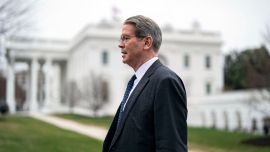A few weeks ago, I analysed the possibility that Cristina Fernández de Kirchner should drop her electoral bid, negotiate with the Peronist opposition in order to position a number of supporters among legislative candidates, and guarantee that the ruling Cambiemos (Let’s Change) coalition loses the 2019 elections. The thought experiment was met with scepticism by most people I spoke to, noting that CFK could garner a hypothetical 30 percent of the vote in the elections, granting her a substantial portion of power as the leading opposition candidate. She would retain her senatorial seat and therefore immunity from judicial cases being pursued against her, while her son Máximo would benefit from his seat in the Chamber of Deputies and daughter Florencia would be safe in Cuba, where she is being treated for supposed medical ailments. Recent polling has shown that Cristina has strengthened her claim to the presidency among potential voters as Macri continues to fall from grace, further supporting her rationale in running. Furthermore, her strategy of silent campaigning continues to work, as Macri continues to polarise with the former president and the Judiciary keeps breathing down her neck.
President Macri is facing the toughest days of his presidency. The relentlessness of the economic recession, coupled with rising inflation, continues to eat away at his electoral possibilities, while CFK has grown in polls and a motley crew of Peronists attempts to chip away at both of their power bases with increasing success. According to a recent survey by political consultancy Synopsis held in April, Macri’s cumulative image stands at negative 34.9 percent, with the intention to vote for the government at its lowest since he took the Casa Rosada, at 29.8 percent. The other side of the coin is that 57 percent of those surveyed indicated they are willing to vote for the opposition, while 13.2 percent remain undecided.
Even more troubling for the president is the fact that, projecting undecided voters, he would lose the run-off against Cristina, Roberto Lavagna or Sergio Massa. Not too long ago, the government was sitting on figures indicating that only he and Cristina would make it through to the run-off and that he would convincingly beat the former president, while all other opposition candidates would fail to make it to the run-off but could handily beat Macri. That was an argument in favour of Cristina dropping her candidacy – and at the same time an argument for the president to lead Cambiemos’ bid for re-election.
As for potential rivals inside his own coalition, speculation surrounding “Plan V” was quickly debunked. The idea floated among those close to Macri hypothesised that Buenos Aires Province Governor María Eugenia Vidal, Cambiemos’ leading candidate in every poll, should run for the presidency, guaranteeing a victory against practically every candidate. While Vidal never explicitly gave any creed to this scenario, she sought to split the provincial elections from the national bout in order to avoid losing votes, given her proximity to the president. Ruling the tough Buenos Aires Province, the nation’s most populous and at the same time most troubled region, is tough enough, but with the opposition in the Casa Rosada it would’ve meant hell for Cambiemos’ political wunderkind.
Vidal, like Buenos Aires City Mayor Horacio Rodríguez Larreta, pledged to support Macri by holding their elections simultaneously with the national vote. Both Larreta and Vidal owe their political careers to Macri and have shown their loyalty, yet they have become increasingly concerned about certain mannerisms within the Casa Rosada. Namely, they criticise the lack of a “political” vision that seeks to build consensus with the Peronist opposition through dialogue. The main culprit, in their eyes, is Cabinet Chief Marcos Peña, along with star Ecuadorean advisor Jaime Durán Barba. Echoing their concerns are the Radicals of the Unión Cívica Radical (UCR), Cambiemos’ key allies, who not only despise Peña but are also extremely concerned with Macri’s austerity programme. Throughout most of his presidency, Macri has given the Radicals the cold shoulder, while relying on the so-called “kitchen cabinet” of closest advisors, all belonging to his own PRO party and dubbed “the shareholders.”
While the government has sought to give the market, and the International Monetary Fund (IMF), free rein over the economy, both Radicals and Peronists have asked for pro-growth policies. While Macri despises this kind of interventionism, galloping inflation and his tanking approval ratings forced his hand. This week, the government announced price controls seeking to tame inflation until after the election. Whatever one may think of those policies, it shows that Macri and his inner circle are beginning to feel the pain – and thus looking for alternatives that will help them secure re-election.
Counterintuitively, the business community has shown its extreme discontent with Macri. Not only has the economic turmoil eaten away at their profits, but the so-called “notebooks of corruption” graft scandal has put them in the eye of the storm. They also despise Peña. As does the opposition. At the same time, most of what has come to be known as the “círculo rojo,” or group of national decision makers, lauds Larreta as an effective manager. Peña is seen as a genius electoral strategist, yet his capacity to govern is questioned by everyone, except Macri.
As Macri seeks to woo the middle class with price controls, he could attempt to seduce the “círculo rojo” by pledging to make Larreta his Cabinet Chief in 2020, displacing Peña subtly as he is tasked with running the campaign. Most who have heard this argument laugh, but not only does Larreta have a good rapport with the business community and the opposition, his approval ratings are also higher than Peña’s. Whether Larreta would ever agree to this scenario is questionable, particularly as his lead in the mayoral elections could come under siege by Martín Lousteau, who challenged him previously and is said to be looking to be Macri’s runningmate. He is also seen as Macri’s potential successor in 2023.
Would this be enough to win the election? Probably not, even though things are in flux, and not on its own. It is difficult to project into the future, yet it would be further evidence of Macri and his team looking for alternatives that would please unsatisfied sectors who are today more likely to vote someone like Lavagna, the former economy minister.
FOMO is a common phrase among millennials and centennials. It is an acronym for “fear of missing out.” In Argentina, no-one (no politician that is) wants to miss out on a big chance in this year’s elections, but the risk is higher than ever, for everyone. In The Art of War, Sun-Tze explained strategic creativity thusly: “The art of war teaches us to rely not on the likelihood of the enemy’s not coming, but on our own readiness to receive him; not on the chance of his not attacking, but rather on the fact that we have made our position unassailable.” It would surprise me if Macri and his electoral team haven’t read it.






















Comments